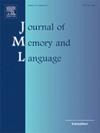Individual differences in state and trait mind-wandering influence episodic memory encoding and retrieval dynamics
IF 3
1区 心理学
Q1 LINGUISTICS
引用次数: 0
Abstract
Mind-wandering is a cognitive state in which attention shifts away from a primary task to unrelated thoughts, often occurring without the individual’s awareness, and there may be both a state and trait component of mind-wandering such that some people may have a higher propensity to mind wander. In the present study, we investigated the relationship between mind-wandering and episodic memory, distinguishing between mind-wandering as a transient state versus a trait, individual differences characteristic. Specifically, through two individual differences experiments involving word list learning tasks, we explored how both state and trait mind-wandering affect overall memory performance and the dynamics of retrieval. Results indicated that state mind-wandering negatively correlated with recall and uniquely predicted memory outcomes. Additionally, participants prone to state mind-wandering showed a decreased likelihood of initiating recall with the first word studied. In contrast, while both state and trait mind-wandering were negatively associated with recall performance, trait mind-wandering did not uniquely influence memory performance. Moreover, evidence suggested that high trait mind-wandering may impair the lag-recency effect, indicating challenges in leveraging temporal contextual cues for memory retrieval. These findings suggest that while in-the-moment mind-wandering can disrupt memory formation, a predisposition towards mind-wandering does not necessarily impair memory ability but may impact the dynamics of retrieval.
状态和特质走神的个体差异影响情景记忆编码和检索动态
走神是一种认知状态,在这种状态下,注意力从主要任务转移到不相关的想法上,通常在个人意识不到的情况下发生。走神可能既有状态成分,也有特征成分,因此有些人可能更倾向于走神。在本研究中,我们探讨了走神与情景记忆之间的关系,区分了走神作为一种短暂状态与一种特质、个体差异特征之间的关系。具体而言,我们通过两个涉及词表学习任务的个体差异实验,探讨了状态和特质走神对整体记忆表现和检索动态的影响。结果表明,状态走神与回忆负相关,并能唯一预测记忆结果。此外,倾向于走神状态的参与者对研究的第一个单词进行回忆的可能性降低。相比之下,虽然状态走神和特质走神都与回忆表现呈负相关,但特质走神并不是唯一影响记忆表现的因素。此外,有证据表明,高特质走神可能会损害滞后效应,这表明在利用时间上下文线索进行记忆检索方面存在挑战。这些发现表明,虽然瞬间走神会破坏记忆的形成,但走神的倾向并不一定会损害记忆能力,但可能会影响检索的动态。
本文章由计算机程序翻译,如有差异,请以英文原文为准。
求助全文
约1分钟内获得全文
求助全文
来源期刊
CiteScore
8.70
自引率
14.00%
发文量
49
审稿时长
12.7 weeks
期刊介绍:
Articles in the Journal of Memory and Language contribute to the formulation of scientific issues and theories in the areas of memory, language comprehension and production, and cognitive processes. Special emphasis is given to research articles that provide new theoretical insights based on a carefully laid empirical foundation. The journal generally favors articles that provide multiple experiments. In addition, significant theoretical papers without new experimental findings may be published.
The Journal of Memory and Language is a valuable tool for cognitive scientists, including psychologists, linguists, and others interested in memory and learning, language, reading, and speech.
Research Areas include:
• Topics that illuminate aspects of memory or language processing
• Linguistics
• Neuropsychology.

 求助内容:
求助内容: 应助结果提醒方式:
应助结果提醒方式:


